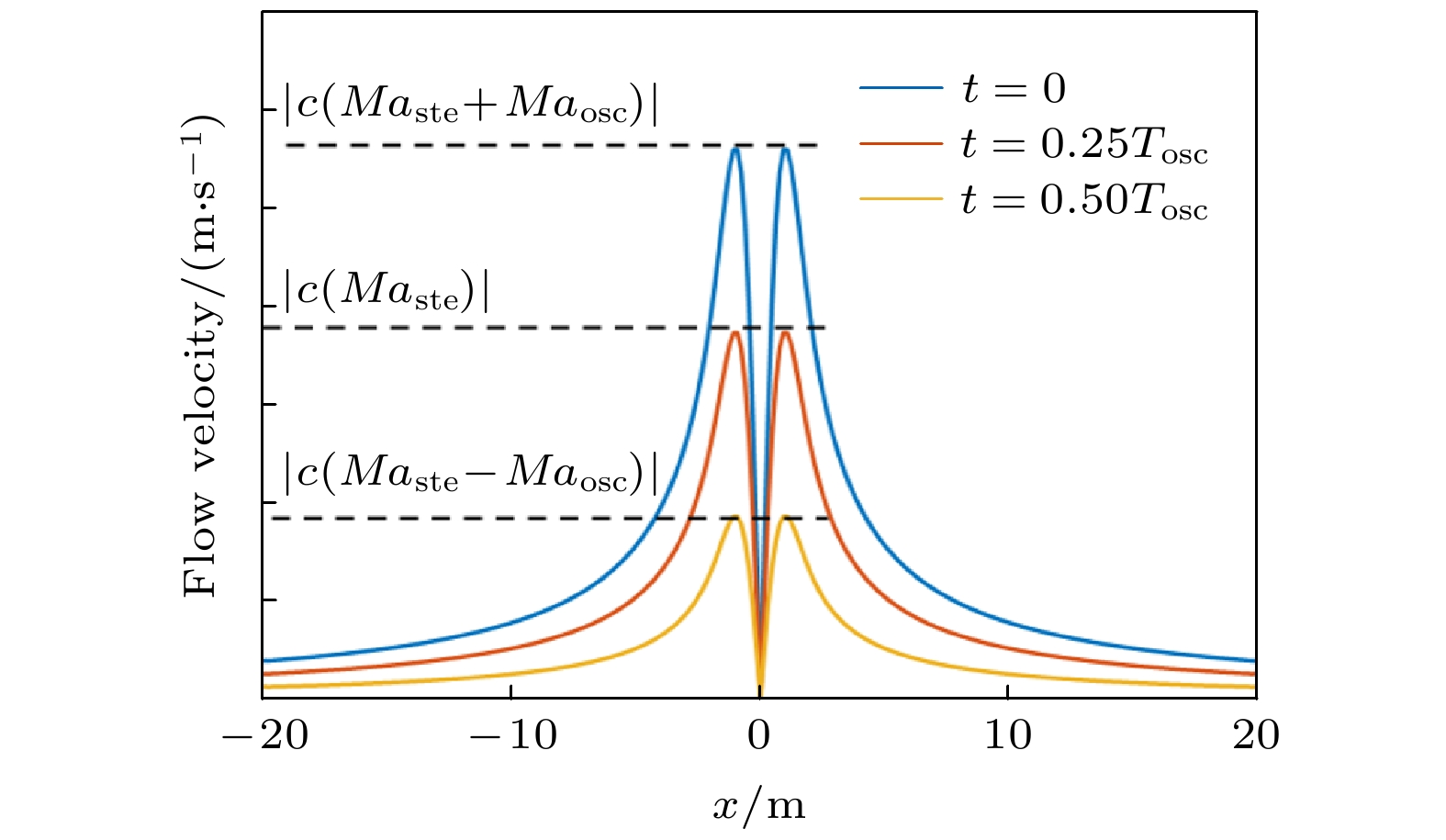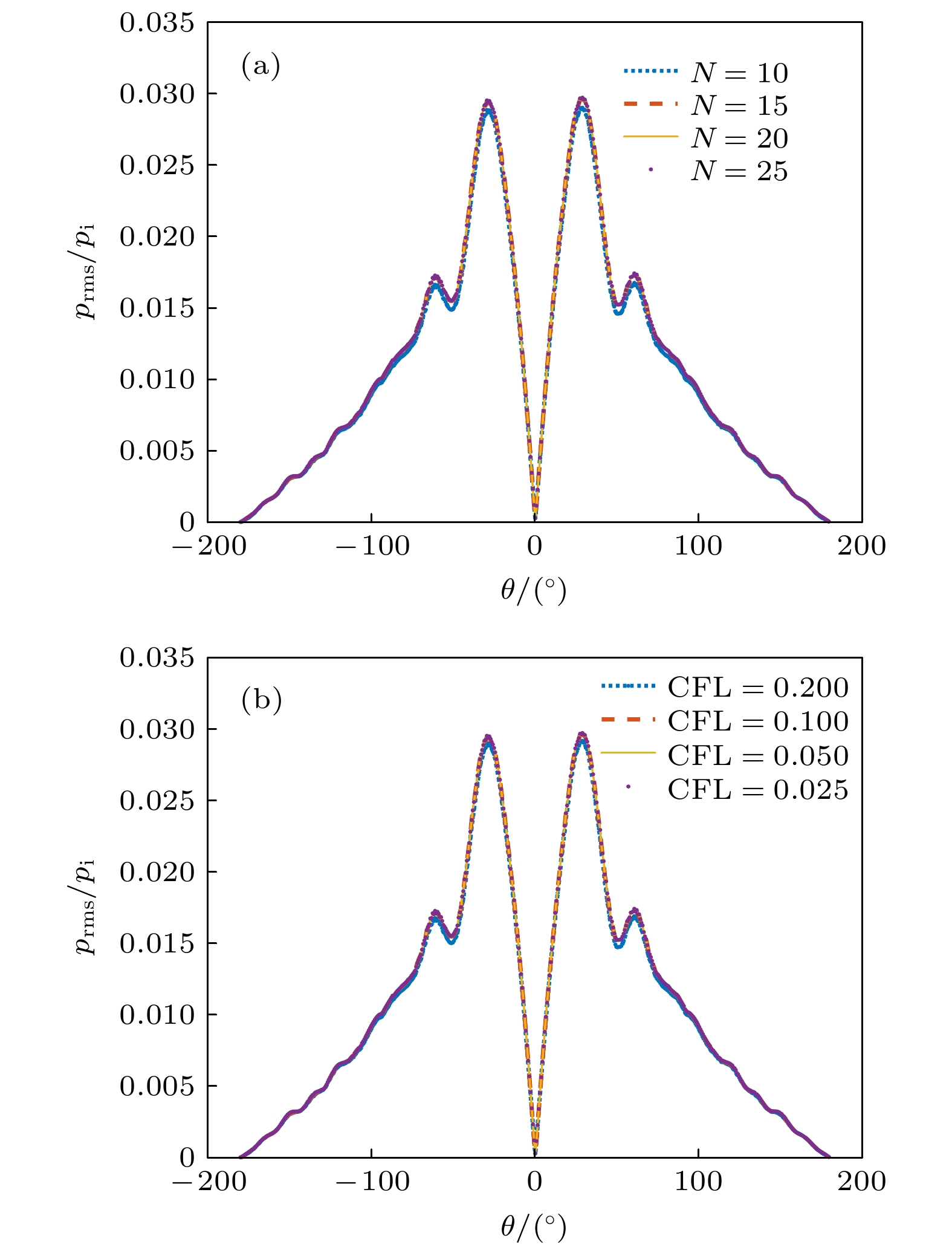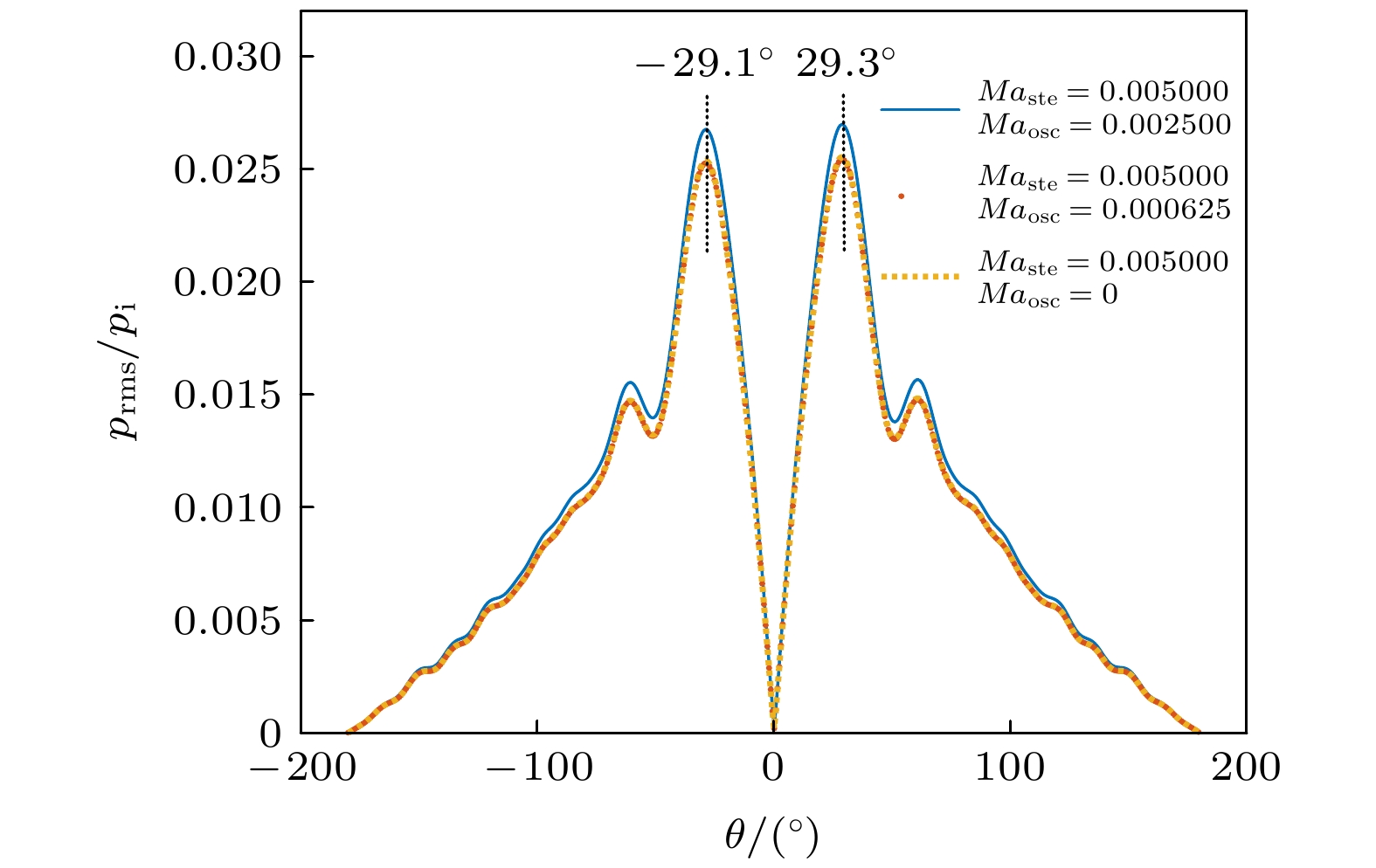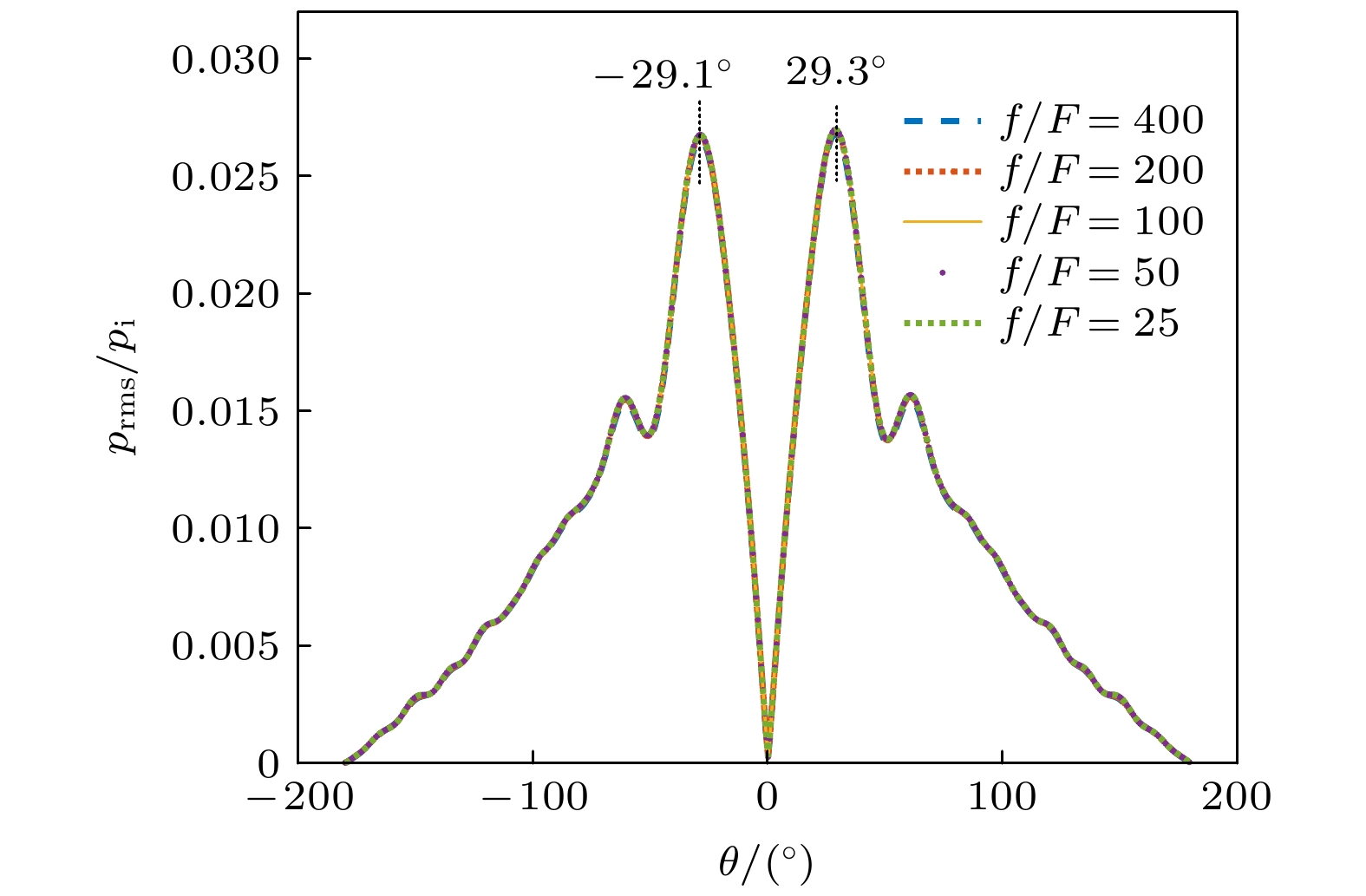-
The scattering of sound waves by underwater vortex flow filed is the basic problem of sound waves propagating in complex flow fields, which has important significance in implementing underwater target detection and sound imaging of flow field. The theoretical analysis model and numerical calculation method are established for the problem of sound scattering modulation in underwater low frequency oscillating vortex flow fields, and the generation mechanism and time frequency and space characteristics of the scattering modulation sound field are explored. Firstly, based on the wave equation of the moving medium, in the first-order approximation the wave equation is decomposed into the flow-sound coupling term and the non flow-sound coupling term by introducing a potential function, and the flow-sound coupling term is analyzed in the frequency domain, revealing the underwater oscillating vortex flow field. Secondly, the discontinuous Galerkin numerical calculation method is used to solve the wave equation of the moving medium, and the sound propagation process in the underwater low frequency oscillating vortex flow field is numerically simulated. Under the condition of low Mach number, the effects of incident sound frequency, the oscillation frequency of the vortex flow field, and the scale of the vortex core on the time-frequency and space characteristics of the scattering modulating sound fields of vortex flow field are analyzed, and theoretical analysis model is used to explain the characteristics. The research results show that under the condition of low Mach number, the scattering of sound wave by oscillating vortex flow field can produce a scattering modulated sound field containing the harmonic of oscillating frequency side frequency modulation. The amplitude of the scattered sound pressure changes periodically with time, and the forward scattering is much stronger than the backward scattering. The fundamental frequency scattering modulation is much stronger than the frequency doubling scattering modulation. With the increase of the frequency of the incident sound wave and the scale of the vortex core, the intensity of the scattering modulating sound field increases, and the spatial distribution of the total scattering sound field has symmetry and an obvious main lobe, the main lobe is gradually sharpened, the azimuth angle of the main lobe is close to the propagation direction of the incident wave. When the frequency ratio is much greater than 1, the vortex flow field oscillation frequency has little effect on the spatial distribution of the sound field intensity of scattering modulating sound field.
[1] Ostashev V E, Wilson D K 2015 Acoustics in Moving Inhomogeneous Media (New York: CRC Press) pp1–23
[2] Aurégan Y, Maurel A, Pagneux V 2008 Sound-Flow Interactions (Berlin: Springer) pp112–158
[3] Chakraborty P, Balachandar S, Adrian R J 2005 J. Fluid Mech. 535 189
 Google Scholar
Google Scholar
[4] Clair V, Gabard G 2018 J. Fluid Mech. 841 50
 Google Scholar
Google Scholar
[5] Colonius T, Lele S K, Moin P 1994 J. Fluid Mech. 260 271
 Google Scholar
Google Scholar
[6] Karabasov S, Kopiev V, Goloviznin V 2009 Proceedings of the 15th AIAA/CEAS Aeroacoustics Conference (30th AIAA Aeroacoustics Conference) Miami, USA, May 10–12, 2009
[7] 马瑞轩, 王益民, 张树海, 武从海, 王勋年 2021 70 104301
 Google Scholar
Google Scholar
Ma R X, Wang Y M, Zhang S H, Wu C H, Wang X N 2021 Acta Phys. Sin. 70 104301
 Google Scholar
Google Scholar
[8] 王益民, 马瑞轩, 武从海, 罗勇, 张树海 2021 79 194302
 Google Scholar
Google Scholar
Wang Y M, Ma R X, Wu C H, Luo Y, Zhang S H 2021 Acta Phys. Sin. 79 194302
 Google Scholar
Google Scholar
[9] Semenov A G. 2017 Ultra Low Frequency Fields of Moving Bodies (New York: Nova Science Publishers) pp118–141
[10] Catalano P, Wang M, Iaccarino G 2003 Int. J. Heat Fluid Fl. 24 463
 Google Scholar
Google Scholar
[11] Zdravkovich M M 1997 Flow Around Circular Cylinders: Volume 2: Applications (Oxford: Oxford University Press) pp163–201
[12] Lighthill M J 1953 Proc. Cambridge Philos. Soc. 49 531
 Google Scholar
Google Scholar
[13] Kraichnan R H 1953 J. Acoust. Soc. Am. 25 1096
 Google Scholar
Google Scholar
[14] Bogey C, Bailly C, Juve D 2002 AIAA J. 40 235
 Google Scholar
Google Scholar
[15] Bailly C, Juve D 2000 AIAA J. 38 22
 Google Scholar
Google Scholar
[16] Pierce A D. 2019 Acoustics: An Introduction to Its Physical Principles and Applications (East Sandwich: Springer) pp427– 480
[17] Pierce A D 1990 J. Acoust. Soc. Am. 87 2292
 Google Scholar
Google Scholar
[18] Cheinet S, Ehrhardt L, Juve D, Benon B P 2012 J. Acoust. Soc. Am. 132 2198
 Google Scholar
Google Scholar
[19] Cockburn B, Shu C W 2001 J. Sci. Comput. 16 173
 Google Scholar
Google Scholar
[20] Cockburn B, Shu C W 1989 Math. Comp. 52 411
 Google Scholar
Google Scholar
[21] Lee H D, Kwon O J 2013 J. Mech. Sci. Technol. 27 3331
 Google Scholar
Google Scholar
[22] Williamschen M, Gabard G J 2020 AIAA J. 58 1079
 Google Scholar
Google Scholar
[23] 程建春 2019 声学原理(第二版下卷) (北京: 科学出版社) 第969页
Cheng J C 2012 Acoustic principles (Volume II of the Second Edition) (Beijing: Science Press) p969 (in Chinese)
[24] 冯士筰, 李凤岐, 李少菁 1999 海洋科学导论 (北京: 高等教育出版社) 第181页
Feng S Z, Li F Q, Li S J 1999 Introduction to Marine Science (Beijing: Higher Education Press) p181 (in Chinese)
[25] 杜浩, 熊鳌魁, 张咏鸥 2020 声学学报 45 55
 Google Scholar
Google Scholar
Du H, Xiong A K, Zhang Y O 2020 Acta Acoust. 45 55
 Google Scholar
Google Scholar
[26] Jensen F B, Kuperman W A, Porter M B, Schmidt H 2011 Computational Ocean Acoustics (New York: Springer) pp531– 610
[27] Headrick R H, Lynch J F, Kemp J N, Newhall A E, Heydt K 2000 J. Acoust. Soc. Am. 107 201
 Google Scholar
Google Scholar
[28] Ford R, Smith S G L 1999 J. Fluid Mech. 386 305
 Google Scholar
Google Scholar
[29] Fetter A L 1964 Phys. Rev. A 136 1488
 Google Scholar
Google Scholar
-
图 7
$ M{a_{{\text{ste}}}} = 0.005{\text{ }}M{a_{{\text{osc}}}} = 0.000625 $ 时不同时刻散射声压云图 (a)$ t = {T_{{\text{osc}}}} $ ; (b)$ t = 1.25{T_{{\text{osc}}}} $ ; (c)$ t = 1.5{T_{{\text{osc}}}} $ Figure 7. Scattering sound contours of
$ M{a_{{\text{ste}}}} = 0.005{\text{ }}M{a_{{\text{osc}}}} = 0.000625 $ at different time: (a)$ t = {T_{{\text{osc}}}} $ ; (b)$ t = 1.25{T_{{\text{osc}}}} $ ; (c)$ t = 1.5{T_{{\text{osc}}}} $ .图 6
$ M{a_{{\text{ste}}}} = 0.005{\text{ }}M{a_{{\text{osc}}}} = 0 $ 时, 不同时刻散射声压云图 (a)$ t = {T_{{\text{osc}}}} $ ; (b)$ t = 1.25{T_{{\text{osc}}}} $ ; (c)$ t = 1.5{T_{{\text{osc}}}} $ Figure 6. Scattering sound contours of
$ M{a_{{\text{ste}}}} = 0.005{\text{ }}M{a_{{\text{osc}}}} = 0 $ at different times: (a)$ t = {T_{{\text{osc}}}} $ ; (b)$ t = 1.25{T_{{\text{osc}}}} $ ; (c)$ t = 1.5{T_{{\text{osc}}}} $ .图 8
$ M{a_{{\text{ste}}}} = 0.005{\text{ }}M{a_{{\text{osc}}}} = 0.0025 $ 不同时刻散射声压云图 (a)$ t = {T_{{\text{osc}}}} $ ; (b)$ t = 1.25{T_{{\text{osc}}}} $ ; (c)$ t = 1.5{T_{{\text{osc}}}} $ Figure 8. Scattering sound contours of
$ M{a_{{\text{ste}}}} = 0.005{\text{ }}M{a_{{\text{osc}}}} = 0.0025 $ at different times: (a)$ t = {T_{{\text{osc}}}} $ ; (b)$ t = 1.25{T_{{\text{osc}}}} $ ; (c)$ t = 1.5{T_{{\text{osc}}}} $ .图 9 定常涡流场与振荡涡流场散射声压时域图 (a)
$ M{a_{{\text{ste}}}} = 0.005{\text{ }}M{a_{{\text{osc}}}} = 0 $ ; (b)$ M{a_{{\text{ste}}}} = 0.005{\text{ }}M{a_{{\text{osc}}}} = 0.000625 $ ; (c)$ M{a_{{\text{ste}}}} = 0.005{\text{ }}M{a_{{\text{osc}}}} = 0.0025 $ Figure 9. Time domain diagram of scattering sound of steady vortex flow field and oscillating vortex flow field: (a)
$ M{a_{{\text{ste}}}} = $ $ 0.005{\text{ }}M{a_{{\text{osc}}}} = 0 $ ; (b)$ M{a_{{\text{ste}}}} = 0.005{\text{ }}M{a_{{\text{osc}}}} = 0.000625 $ ; (c)$ M{a_{{\text{ste}}}} = 0.005{\text{ }}M{a_{{\text{osc}}}} = 0.0025 $ .图 20 不同马赫数散射指向性图 (a)
$ M{a_{{\text{ste}}}} = 0.005—0.04, M{a_{{\text{osc}}}} = 0.0025 $ ; (b)$M{a_{{\text{ste}}}} = 0.005, $ $ M{a_{{\text{osc}}}} = 0.0003125—0.0025$ Figure 20. Scattering directivity of different Mach numbers: (a)
$M{a_{{\text{ste}}}} = 0.005-0.04, M{a_{{\text{osc}}}} = 0.0025$ ; (b)$M{a_{{\text{ste}}}} = 0.005, $ $ M{a_{{\text{osc}}}} = 0.0003125-0.0025$ .图 21 不同马赫数振荡涡流场
$ t = {T_{{\text{osc}}}} $ 时刻散射声压云图 (a)$ M{a_{{\text{ste}}}} = 0.01 M{a_{{\text{osc}}}} = 0.0025 $ ; (b)$ M{a_{{\text{ste}}}} = 0.005{\text{ }}M{a_{{\text{osc}}}} = 0.0025 $ ; (c)$ M{a_{{\text{ste}}}} = 0.005{\text{ }}M{a_{{\text{osc}}}} = 0.00125 $ Figure 21. Scattering sound contours of different Mach number at
$ t = {T_{{\text{osc}}}} $ : (a)$ M{a_{{\text{ste}}}} = 0.01 M{a_{{\text{osc}}}} = 0.0025 $ ; (b)$M{a_{{\text{ste}}}} = $ $ 0.005{\text{ }}M{a_{{\text{osc}}}} = 0.0025$ ; (c)$ M{a_{{\text{ste}}}} = 0.005{\text{ }}M{a_{{\text{osc}}}} = 0.00125 $ .图 22
$ M{a_{{\text{osc}}}} = 0.0025 $ , 不同$ M{a_{{\text{ste}}}} $ 散射声压时域图 (a)$ M{a_{{\text{ste}}}} = 0.01 $ ; (b)$ M{a_{{\text{ste}}}} = 0.02 $ ; (c)$ M{a_{{\text{ste}}}} = 0.04 $ Figure 22.
$ M{a_{{\text{osc}}}} = 0.0025 $ , time domain diagram of scattering sound of different$ M{a_{{\text{ste}}}} $ : (a)$ M{a_{{\text{ste}}}} = 0.01 $ ; (b)$ M{a_{{\text{ste}}}} = 0.02 $ ; (c)$ M{a_{{\text{ste}}}} = 0.04 $ .图 23
$ M{a_{{\text{osc}}}} = 0.0025 $ , 不同$ M{a_{{\text{ste}}}} $ 散射声压频域图 (a)$ M{a_{{\text{ste}}}} = 0.01 $ ; (b)$ M{a_{{\text{ste}}}} = 0.02 $ ; (c)$ M{a_{{\text{ste}}}} = 0.04 $ Figure 23.
$ M{a_{{\text{osc}}}} = 0.0025 $ , frequency domain diagram of scattering sound of different$ M{a_{{\text{ste}}}} $ : (a)$ M{a_{{\text{ste}}}} = 0.01 $ ; (b)$ M{a_{{\text{ste}}}} = 0.02 $ ; (c)$ M{a_{{\text{ste}}}} = 0.04 $ .图 24
$ M{a_{{\text{ste}}}} = 0.005 $ , 不同$ M{a_{{\text{osc}}}} $ 散射声压时域图 (a)$ M{a_{{\text{osc}}}} = 0.0003125 $ ; (b)$ M{a_{{\text{osc}}}} = 0.000625 $ ; (c)$ M{a_{{\text{osc}}}} = 0.00125 $ Figure 24.
$ M{a_{{\text{ste}}}} = 0.005 $ , time domain diagram of scattering sound of different$ M{a_{{\text{osc}}}} $ : (a)$ M{a_{{\text{osc}}}} = 0.0003125 $ ; (b)$M{a_{{\text{osc}}}} = $ $ 0.000625$ ; (c)$ M{a_{{\text{osc}}}} = 0.00125 $ .图 25
$ M{a_{{\text{ste}}}} = 0.005 $ , 不同$ M{a_{{\text{osc}}}} $ 散射声压频域图 (a)$ M{a_{{\text{osc}}}} = 0.0003125 $ ; (b)$ M{a_{{\text{osc}}}} = 0.000625 $ ; (c)$ M{a_{{\text{osc}}}} = 0.00125 $ Figure 25.
$ M{a_{{\text{ste}}}} = 0.005 $ , frequency domain diagram of scattering sound of different$ M{a_{{\text{osc}}}} $ : (a)$ M{a_{{\text{osc}}}} = 0.0003125 $ ; (b)$M{a_{{\text{osc}}}} = $ $ 0.000625$ ; (c)$ M{a_{{\text{osc}}}} = 0.00125 $ . -
[1] Ostashev V E, Wilson D K 2015 Acoustics in Moving Inhomogeneous Media (New York: CRC Press) pp1–23
[2] Aurégan Y, Maurel A, Pagneux V 2008 Sound-Flow Interactions (Berlin: Springer) pp112–158
[3] Chakraborty P, Balachandar S, Adrian R J 2005 J. Fluid Mech. 535 189
 Google Scholar
Google Scholar
[4] Clair V, Gabard G 2018 J. Fluid Mech. 841 50
 Google Scholar
Google Scholar
[5] Colonius T, Lele S K, Moin P 1994 J. Fluid Mech. 260 271
 Google Scholar
Google Scholar
[6] Karabasov S, Kopiev V, Goloviznin V 2009 Proceedings of the 15th AIAA/CEAS Aeroacoustics Conference (30th AIAA Aeroacoustics Conference) Miami, USA, May 10–12, 2009
[7] 马瑞轩, 王益民, 张树海, 武从海, 王勋年 2021 70 104301
 Google Scholar
Google Scholar
Ma R X, Wang Y M, Zhang S H, Wu C H, Wang X N 2021 Acta Phys. Sin. 70 104301
 Google Scholar
Google Scholar
[8] 王益民, 马瑞轩, 武从海, 罗勇, 张树海 2021 79 194302
 Google Scholar
Google Scholar
Wang Y M, Ma R X, Wu C H, Luo Y, Zhang S H 2021 Acta Phys. Sin. 79 194302
 Google Scholar
Google Scholar
[9] Semenov A G. 2017 Ultra Low Frequency Fields of Moving Bodies (New York: Nova Science Publishers) pp118–141
[10] Catalano P, Wang M, Iaccarino G 2003 Int. J. Heat Fluid Fl. 24 463
 Google Scholar
Google Scholar
[11] Zdravkovich M M 1997 Flow Around Circular Cylinders: Volume 2: Applications (Oxford: Oxford University Press) pp163–201
[12] Lighthill M J 1953 Proc. Cambridge Philos. Soc. 49 531
 Google Scholar
Google Scholar
[13] Kraichnan R H 1953 J. Acoust. Soc. Am. 25 1096
 Google Scholar
Google Scholar
[14] Bogey C, Bailly C, Juve D 2002 AIAA J. 40 235
 Google Scholar
Google Scholar
[15] Bailly C, Juve D 2000 AIAA J. 38 22
 Google Scholar
Google Scholar
[16] Pierce A D. 2019 Acoustics: An Introduction to Its Physical Principles and Applications (East Sandwich: Springer) pp427– 480
[17] Pierce A D 1990 J. Acoust. Soc. Am. 87 2292
 Google Scholar
Google Scholar
[18] Cheinet S, Ehrhardt L, Juve D, Benon B P 2012 J. Acoust. Soc. Am. 132 2198
 Google Scholar
Google Scholar
[19] Cockburn B, Shu C W 2001 J. Sci. Comput. 16 173
 Google Scholar
Google Scholar
[20] Cockburn B, Shu C W 1989 Math. Comp. 52 411
 Google Scholar
Google Scholar
[21] Lee H D, Kwon O J 2013 J. Mech. Sci. Technol. 27 3331
 Google Scholar
Google Scholar
[22] Williamschen M, Gabard G J 2020 AIAA J. 58 1079
 Google Scholar
Google Scholar
[23] 程建春 2019 声学原理(第二版下卷) (北京: 科学出版社) 第969页
Cheng J C 2012 Acoustic principles (Volume II of the Second Edition) (Beijing: Science Press) p969 (in Chinese)
[24] 冯士筰, 李凤岐, 李少菁 1999 海洋科学导论 (北京: 高等教育出版社) 第181页
Feng S Z, Li F Q, Li S J 1999 Introduction to Marine Science (Beijing: Higher Education Press) p181 (in Chinese)
[25] 杜浩, 熊鳌魁, 张咏鸥 2020 声学学报 45 55
 Google Scholar
Google Scholar
Du H, Xiong A K, Zhang Y O 2020 Acta Acoust. 45 55
 Google Scholar
Google Scholar
[26] Jensen F B, Kuperman W A, Porter M B, Schmidt H 2011 Computational Ocean Acoustics (New York: Springer) pp531– 610
[27] Headrick R H, Lynch J F, Kemp J N, Newhall A E, Heydt K 2000 J. Acoust. Soc. Am. 107 201
 Google Scholar
Google Scholar
[28] Ford R, Smith S G L 1999 J. Fluid Mech. 386 305
 Google Scholar
Google Scholar
[29] Fetter A L 1964 Phys. Rev. A 136 1488
 Google Scholar
Google Scholar
Catalog
Metrics
- Abstract views: 7648
- PDF Downloads: 153
- Cited By: 0














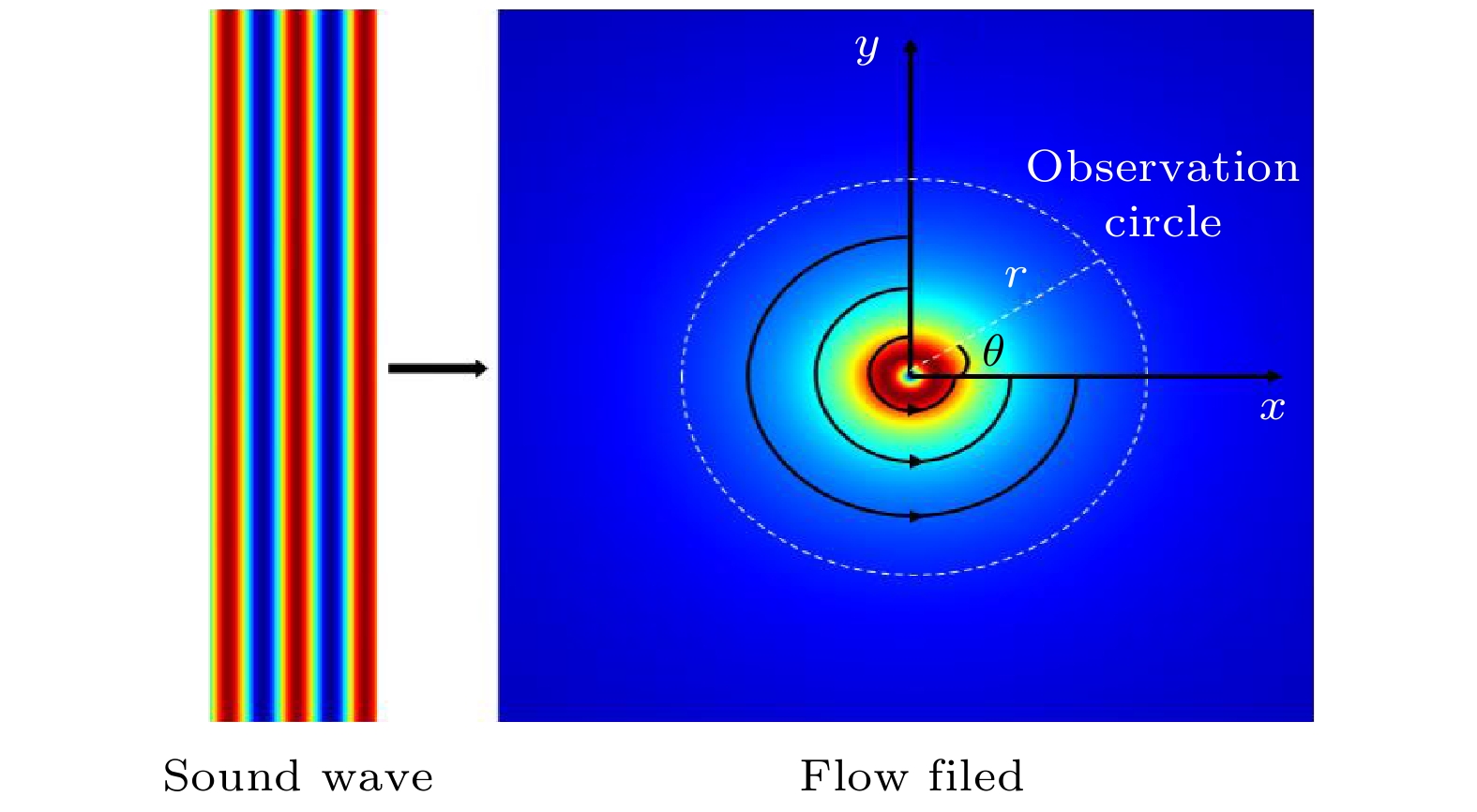
 DownLoad:
DownLoad:
